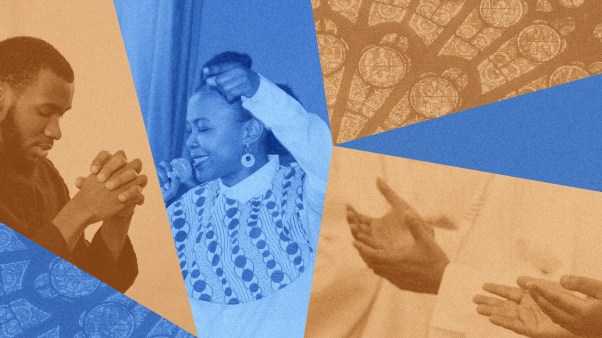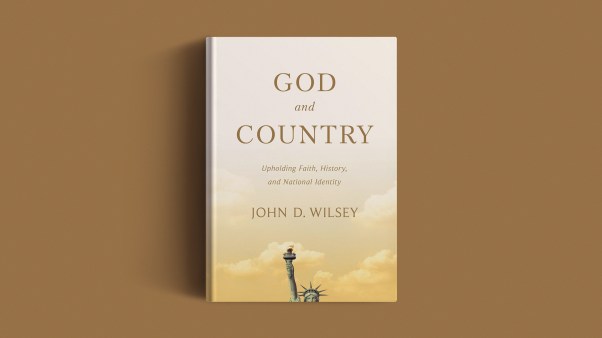Here’s the scene: One day you’re catching up with a friend, and he tells you, after some deliberation, that he’s recently joined a new group. It immediately sounds weird, even alarming. He’s hesitant to answer your questions but finally spills the beans.
This group has a confusing mishmash of philosophy and lifestyle guidance. It seems to have a lot of rules, including “voluntary” monetary donations. (Some of the early adopters, he says, fully merged their finances—isn’t that a red flag?) The group is small but growing, and he’s not sure how he first heard about it. He laughs nervously and clarifies that it’s “not a cult.”
The group, he goes on to explain, is led by a mysterious figure whom no one has seen for years. Group members insist he’s still alive—maybe in hiding? This part is especially strange. This figure will be in touch when you’ve joined, although admittedly he prefers to communicate through intermediaries (who just so happen to be on the group’s payroll).
As for the leader’s message, it’s bewildering: The world is not what you think it is. The authorities cannot be trusted. Something is off. Behind what polite manners and public officials let us say out loud, there’s an insidious, secret power at work. A constellation of powers, to be accurate, covert and nameless.
Granted, your friend admits, you can’t see these powers. But they’re there, all right. They influence the beliefs of leaders and the behavior of institutions at the highest levels. They influence your neighbors, friends, and family. They influence you.
More important, they are not to be trusted. Trust instead in this group, which serves as the vanguard of resistance. Start attending meetings. Rescind your acquiescence to the status quo. Swear a new allegiance. Submit to mysterious rituals. And once you do—you now notice a look in your friend’s eyes you’ve never seen before—you’ll have access to a type of knowledge and power others lack. You’ll never see things the same way again; you’ll even, in a way, be involved in saving the world.
Now what do you say? Are you put off? Is this a joke? Has your friend fallen prey to a conspiracy theory? Is this group the Freemasons? The Branch Davidians? QAnon? Is it about UFOs and aliens? X-Files or Alex Jones?
It’s none of these. It’s Christianity. The group is the church, and your friend is a new Christian.
By any reasonable definition, Christianity is a conspiracy theory. Let’s say it’s a theory of two conspiracies, in fact: the conspiracy of sin, death, and the Devil to put humanity and all creation in “bondage to decay” and the conspiracy by God to liberate creation and redeem his people through Christ (Rom. 8:18–23, RSV throughout).
I realize it seems odd to describe our faith this way, but that’s the proposition I’d like you to ponder. Because if Christianity is a conspiracy theory, then what follows for how believers approach other conspiracy theories in our culture?
Start with a working definition. A conspiracy theory is a form of stigmatized knowledge formally repudiated by elites and/or experts that alleges malign forces behind public events. Knowledge of this truth is kept from the public through official channels and is therefore difficult to prove. As a result, those who learn the truth tend to be suspicious of authorities and may form communities of dissent, or at a minimum be drawn to them. Within these groups, rejecting the public story on a given topic becomes a badge of honor—and belonging.
It seems plain to me that, on this definition, the church’s faith in the gospel qualifies as a conspiracy theory. This was certainly true at its inception, and I think it’s true in our time too.
To say the gospel carried a stigma in the Roman Empire would be a serious understatement. The Roman authorities mocked, despised, and punished conversion to Christ. When Paul and Silas came to Thessalonica, a mob responded by going to the city authorities and declaring, “These men who have turned the world upside down have come here also … and they are all acting against the decrees of Caesar, saying that there is another king, Jesus” (Acts 17:6–7).
To residents of Greece, the gospel seemed crazy—it turned the world on its head. Greek thought seamlessly wove together religious, moral, political, economic, and epistemic claims, and Christianity unraveled all of it. (Epistemic refers to knowledge, what we know and how we know it.) To ancient pagans, Christianity was quite literally insane.
As a Roman governor, Festus, says later in Acts, “Paul, you are mad; your great learning is turning you mad” (26:24). And as Paul himself writes to the believers in Corinth,
Where is the wise man? Where is the scribe? Where is the debater of this age? Has not God made foolish the wisdom of the world? For since, in the wisdom of God, the world did not know God through wisdom, it pleased God through the folly of what we preach to save those who believe. For Jews demand signs and Greeks seek wisdom, but we preach Christ crucified, a stumbling block to Jews and folly to Gentiles, but to those who are called, both Jews and Greeks, Christ the power of God and the wisdom of God. For the foolishness of God is wiser than men, and the weakness of God is stronger than men. (1 Cor. 1:20–25)
The church, then, was born as a community of dissent—fathered, you might say, by divine foolishness. From the start, therefore, Christians doubted the official line and alleged that malign forces were within and behind the public events of the day. And Christianity’s most fundamental claims have always been, if not unfalsifiable, then at least difficult to verify with epistemic certainty.
Is it any different for Christians in the West today? Christian beliefs still come with stigma, whether moral or metaphysical. The Devil is still abroad in the world. The church still holds to Paul’s reminder that “we are not contending against flesh and blood, but against the principalities, against the powers, against the world rulers of this present darkness, against the spiritual hosts of wickedness in the heavenly places” (Eph. 6:12).
And elite institutions still reject the church’s claims. As in Rome—albeit for quite different reasons—it is illegal for our governments to endorse them. No wonder many Christians are slow to trust authorities, particularly epistemic authorities. Trusting them without remainder could well mean giving up the faith.
None of this is to say that Christians should give credence to (what I am tempted to call “actual”) conspiracy theories—much less to suggest that people who traffic in wild, ugly, reckless, or wicked deception and speculation are on a par with preachers and evangelists. God judges teachers of all kinds with “greater strictness” (James 3:1), and few of us would deny that news and social media are full of what CT editor Bonnie Kristian calls “epistemic poison.” I am not, therefore, advocating a kind of epistemic nonjudgmentalism, where we shrug at crazy beliefs because, after all, we all believe crazy things.
Instead, from the parallel between the gospel and conspiracy theories, I want to propose four ideas for Christians grappling with faith, knowledge, authority, and marginal beliefs.
First, the notion of a cultural mainstream—everything everyone “just knows” to be true—is at the least misleading and, I would argue, a dead end. As the early church well knew, the majority is not always right. Nor are the experts and elites.
Christians should be quick to see this since we believe things that are wild and even “fringe” when judged by secular standards. We also believe in sin, which darkens the mind and clouds human faculties of judgment. We should not be surprised, then, if the truth is difficult to obtain, neither easy nor simple nor obvious.
Second, appealing to elite or expert authority to disprove a conspiracy theory was always a logical fallacy, but in our moment it is a particularly ineffective one. We’re living in a time of mass distrust of elites, and “the experts” often disagree among themselves, even about the basics. Moreover, expertise is too often wielded not so much as knowledge but as power—as a conversation stopper that allows, in Neil Postman’s phrase, the “priest-experts” of our technocratic society to control the masses and serve their gods of “efficiency, precision, objectivity.” Conspiracy theories are often a muddled attempt by the epistemic underclass to throw off that yoke. In the hands of some, they become a cudgel for fighting back.
Third, just as the experts sometimes get it wrong, sometimes marginal beliefs turn out to be right—and that has consequences. “If you tell people not to listen to some prominent crank because that person doesn’t represent the establishment view or the consensus position,” observes Catholic New York Times columnist Ross Douthat, “you’re setting yourself up to be written off as a dupe or deceiver whenever the consensus position fails or falls apart.”
Douthat gave the example of supposed weapons of mass destruction in Saddam Hussein’s Iraq. More recently, we could point to the lab-leak theory of the origin of COVID-19. In 2020, prestigious journalistic and scientific publications labeled this idea a baseless conspiracy theory. Yet we now know not only that it is a perfectly plausible, even favored explanation but also that elite epistemic authorities conspired to suppress it.
In writer Phil Christman’s words, “The facts warrant paranoia. At least, some of the facts warrant some paranoia. We cannot reject ‘conspiracy theories’ en bloc.”
Fourth and finally, although we are not without hope in a swirl of confusion and falsehood, we must not clutch at false hope. There are no epistemic good old days to which we might somehow return. There is no way to free ourselves of “misinformation” and “disinformation,” fake news and propaganda. Even if we didn’t have the internet, we would still be fallen human beings surrounded by misunderstandings and lies.
Yet even as the sinners we are, here is what we do have: “a sure and steadfast anchor of the soul, a hope that enters into the inner shrine behind the curtain, where Jesus has gone as a forerunner on our behalf” (Heb. 6:19–20). This anchor is about more than salvation, past or future. It is also about knowledge. Faith in Christ is an epistemic anchor in the troubled seas of our time. Disciples of Christ can cast their uncertainties on him “in whom are hid all the treasures of wisdom and knowledge” (Col. 2:3).
Christians live by trust in a message from a God “who cannot lie” (Titus 1:2, NKJV). The gospel imparts “a secret and hidden wisdom,” which “God has revealed to us through the Spirit” (1 Cor. 2:7, 10). And this wisdom is nothing other than “Christ Jesus our hope” (1 Tim. 1:1), a living person who is always as good as his word.
The love of Christ is both cause and consequence of our hope and faith, and this includes Christ’s own love in us for others. If we have neighbors, friends, and family members under sway of foolish or fantastic notions, our duty to them is love. We need not look on them with mock sympathy or condescension. Nor should we imagine that we can bully them out of their beliefs with stats or fact checking or expert opinion.
No, what we can and must do, to cite Christman again, is will their good. We will one another’s good by sharing life together, and life is shared face to face—not in constant bickering about the details of distant debates but in drawing near to God and the ordinary goods he has granted us to hold in common. There is, alas, no pat solution—no simple test to tell the good conspiracy theories from the bad, the silly from the serious, the innocuous from the dangerous. Conspiracy theories we will always have with us, this side of eternity.
More than a century ago, G. K. Chesterton wrote about arguing with conspiracists. He advised that, when engaging the conspiracist mind, “we should be chiefly concerned not so much to give it arguments as to give it air, to convince it that there [is] something cleaner and cooler outside the suffocation of a single argument.” I have argued that Christianity fits a certain definition of conspiracy theories, but Chesterton helps us to see that what ultimately distinguishes the truth of our faith from conspiracist falsehoods is this cramped and smothering lack of oxygen, a spirit of strung-out nerves and humorless assurance, which never fails to stifle joy, courage, and good cheer.
“In the world you have tribulation; but be of good cheer, I have overcome the world” (John 16:33), Jesus told us. “For God did not give us a spirit of timidity but a spirit of power and love and self-control” (2 Tim. 1:7).
The air of the gospel is nothing less than the Spirit himself, the Lord and giver of life. This is what all of us are meant to breathe. And when we do, the Spirit’s fruit is born in us. As Jesus taught (Matt. 7:16), “You will know them by their fruits.”
Brad East is an associate professor of theology at Abilene Christian University. He is the author of four books, including The Church: A Guide to the People of God and Letters to a Future Saint.

























